Memoir of John Shakespear Bartley, 1916-1919 - Part 5
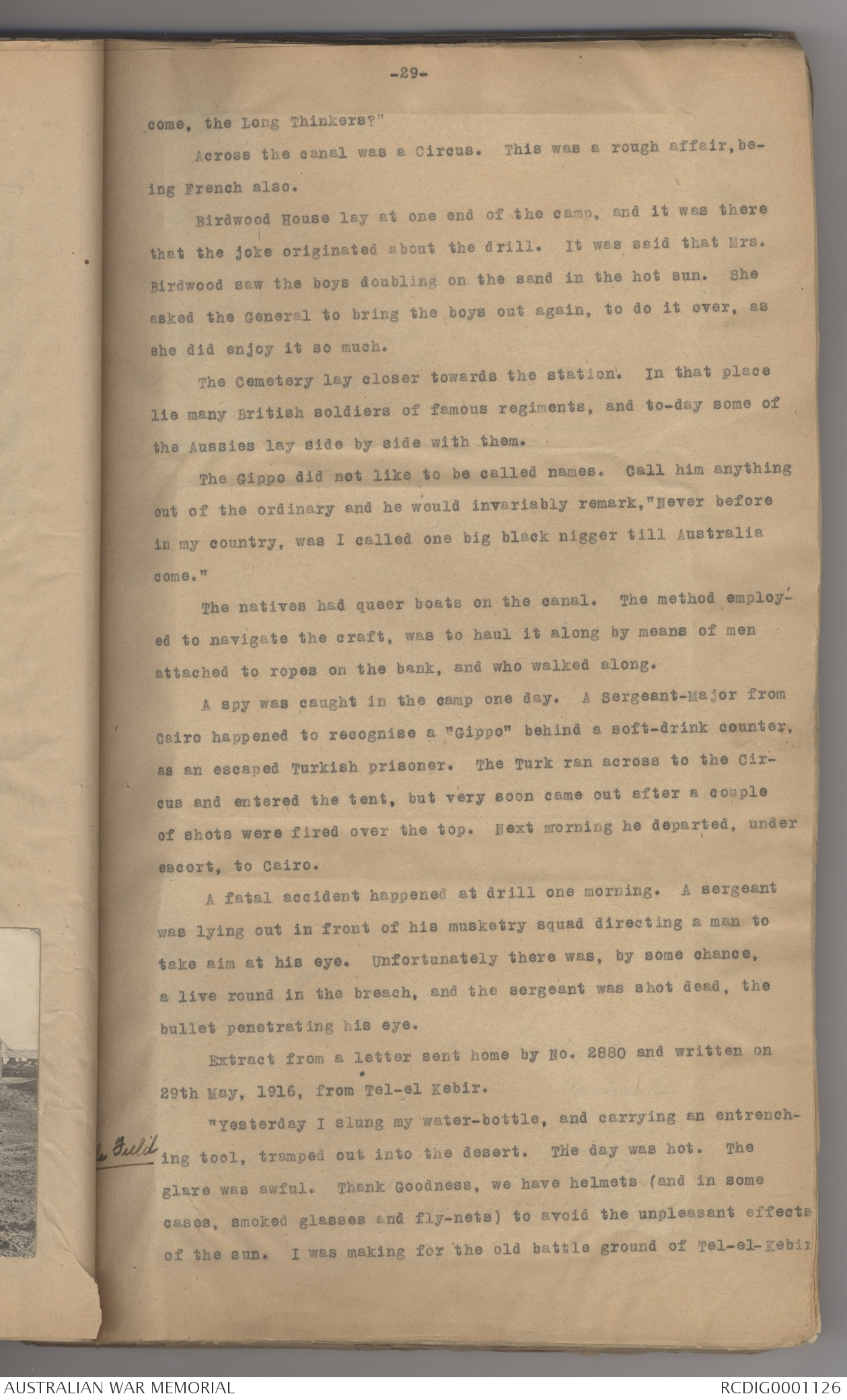
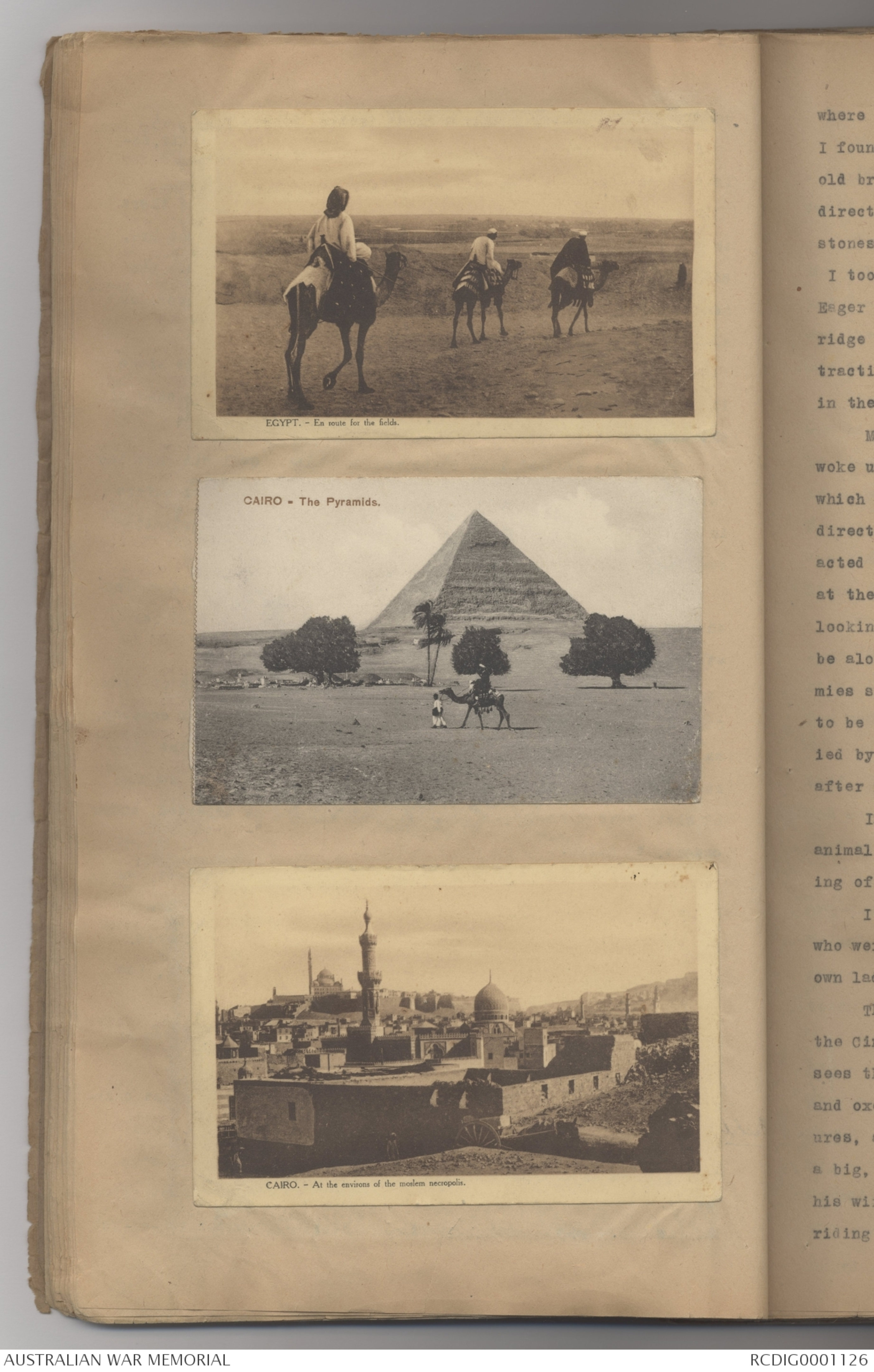
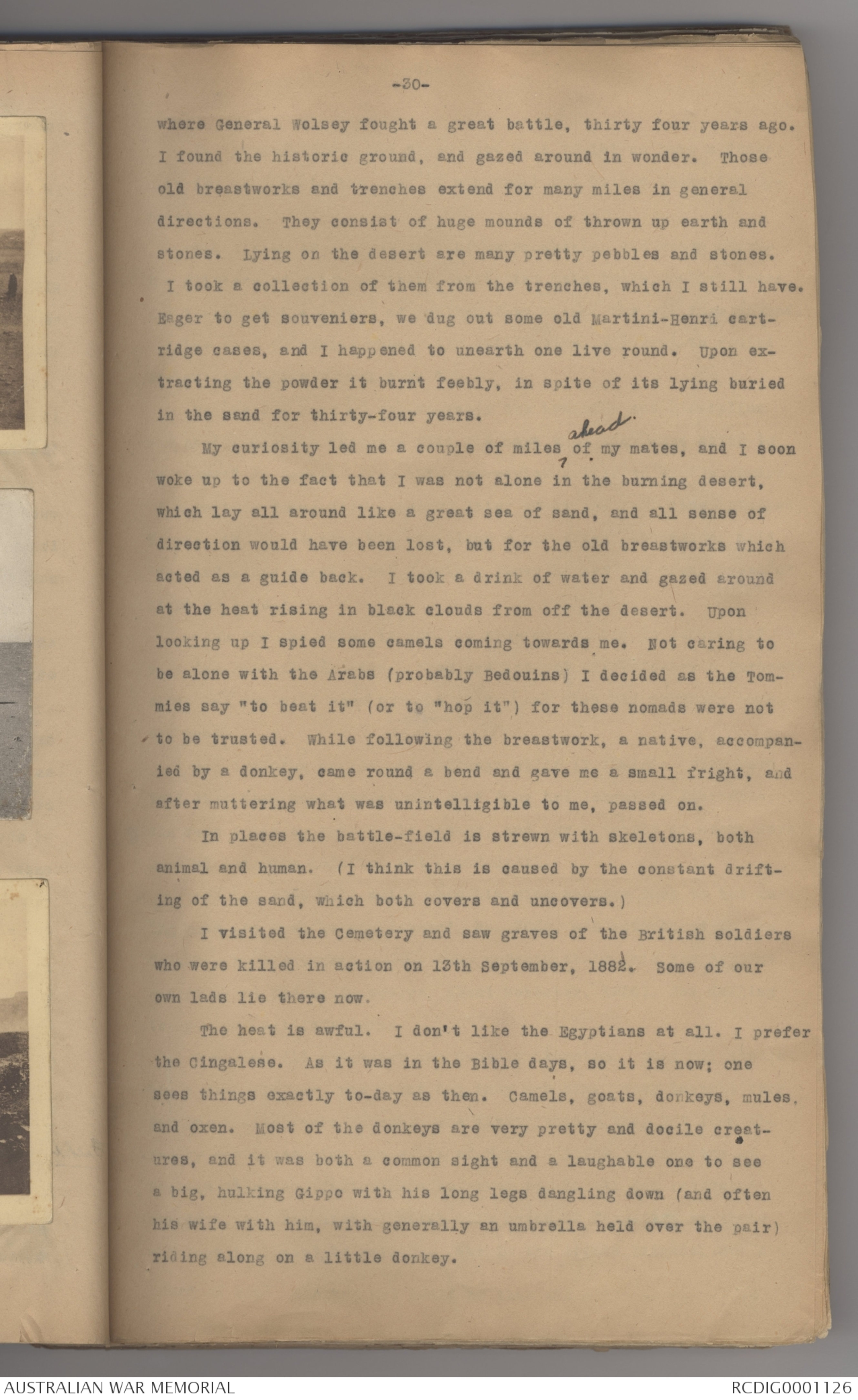
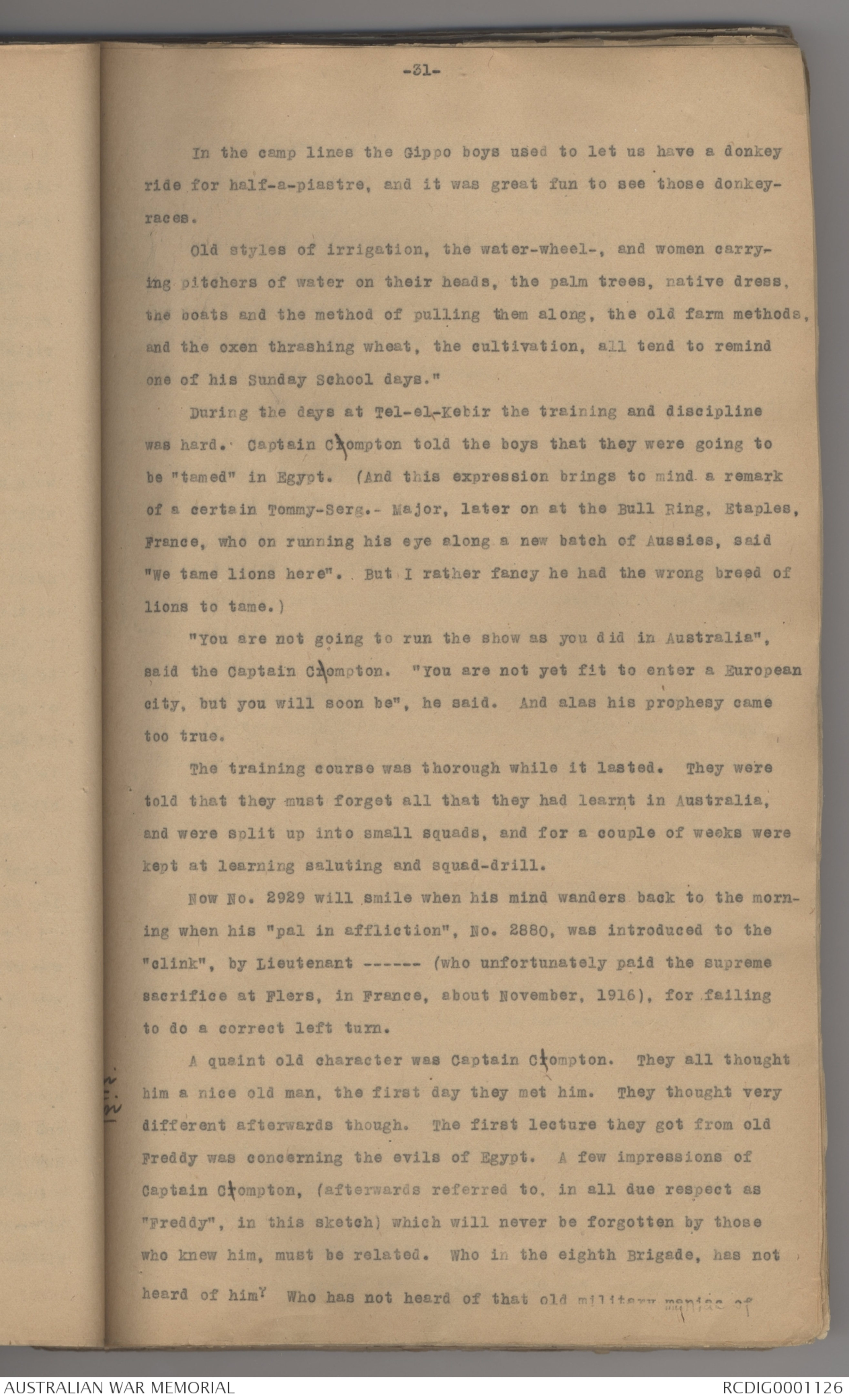
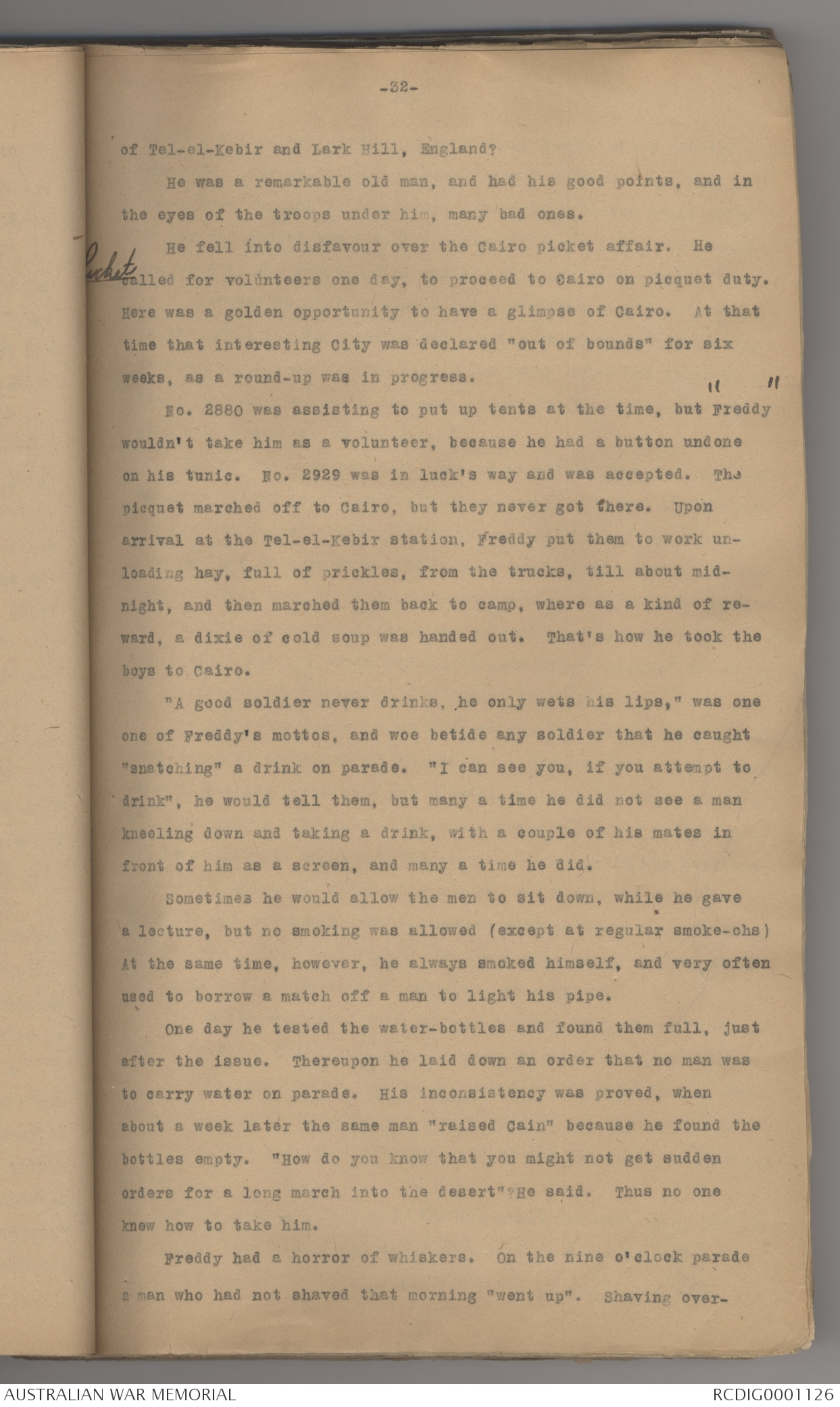
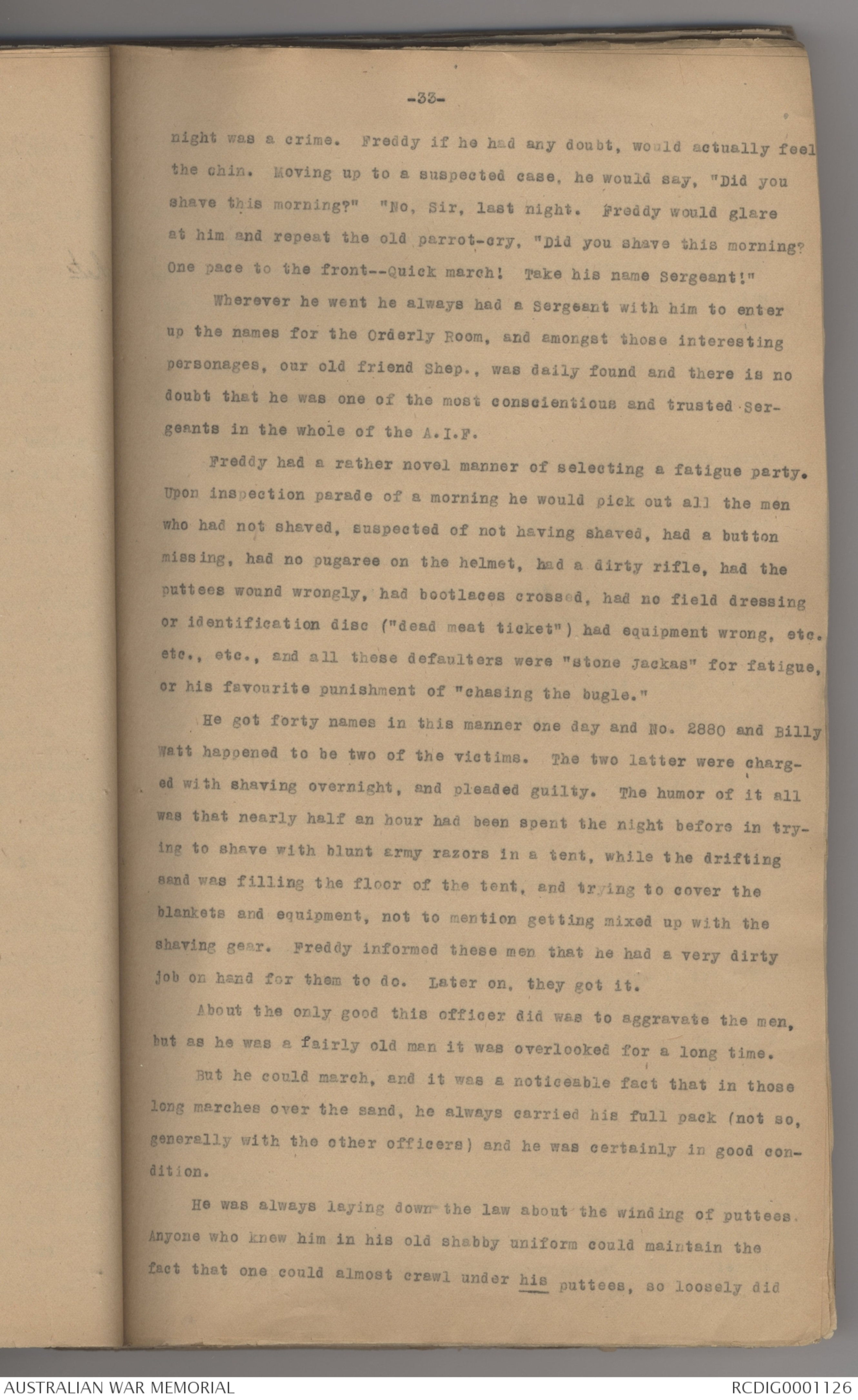
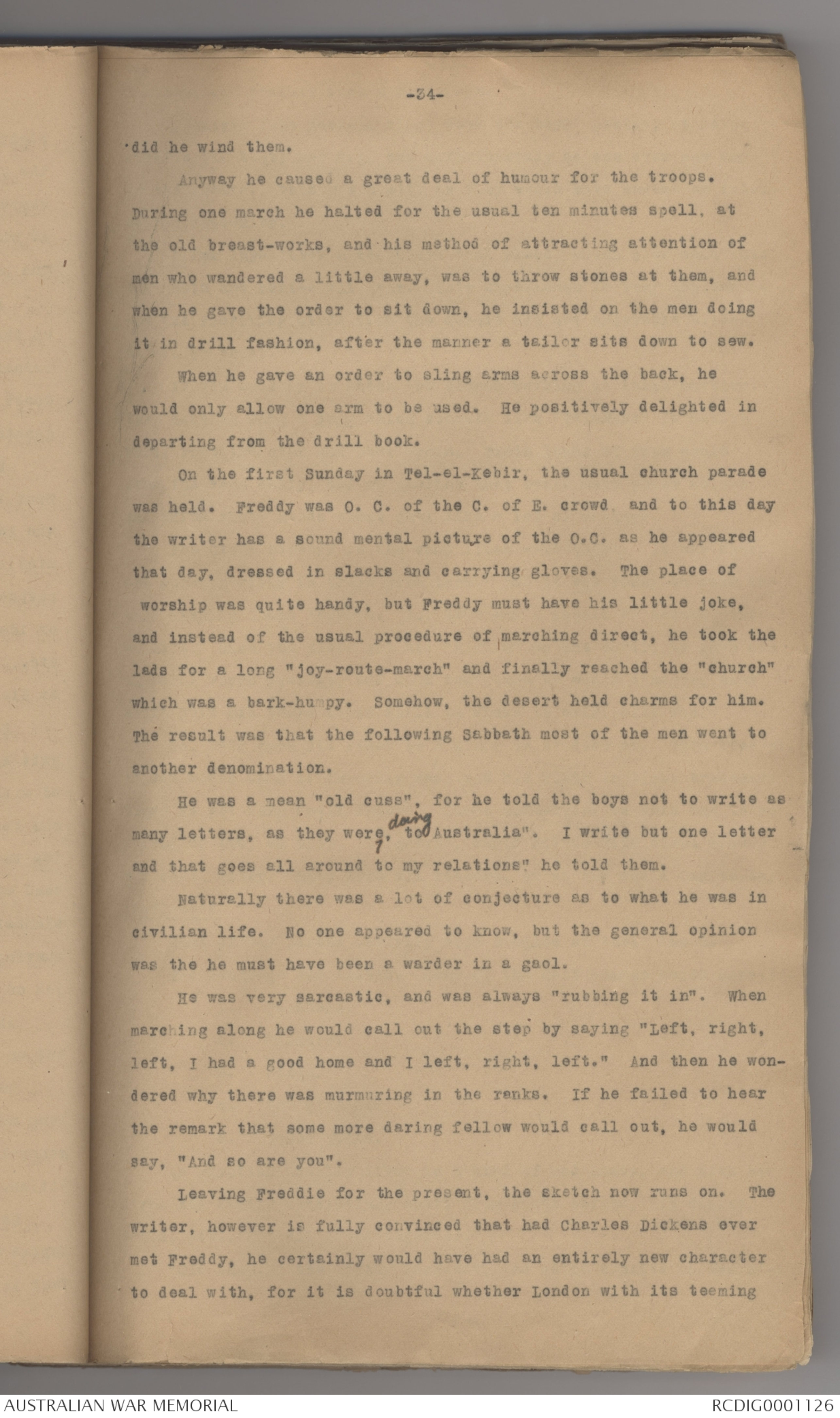
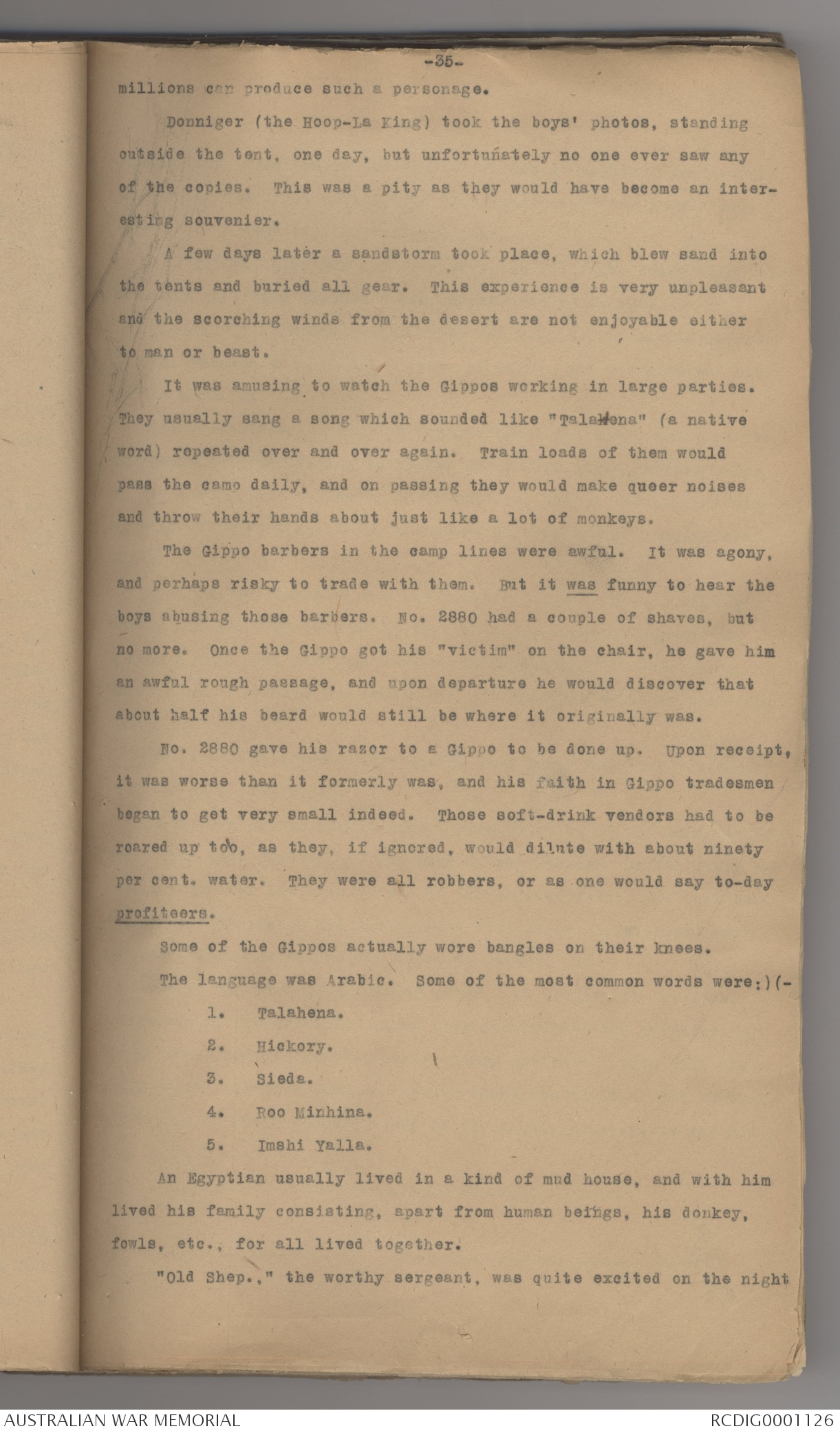
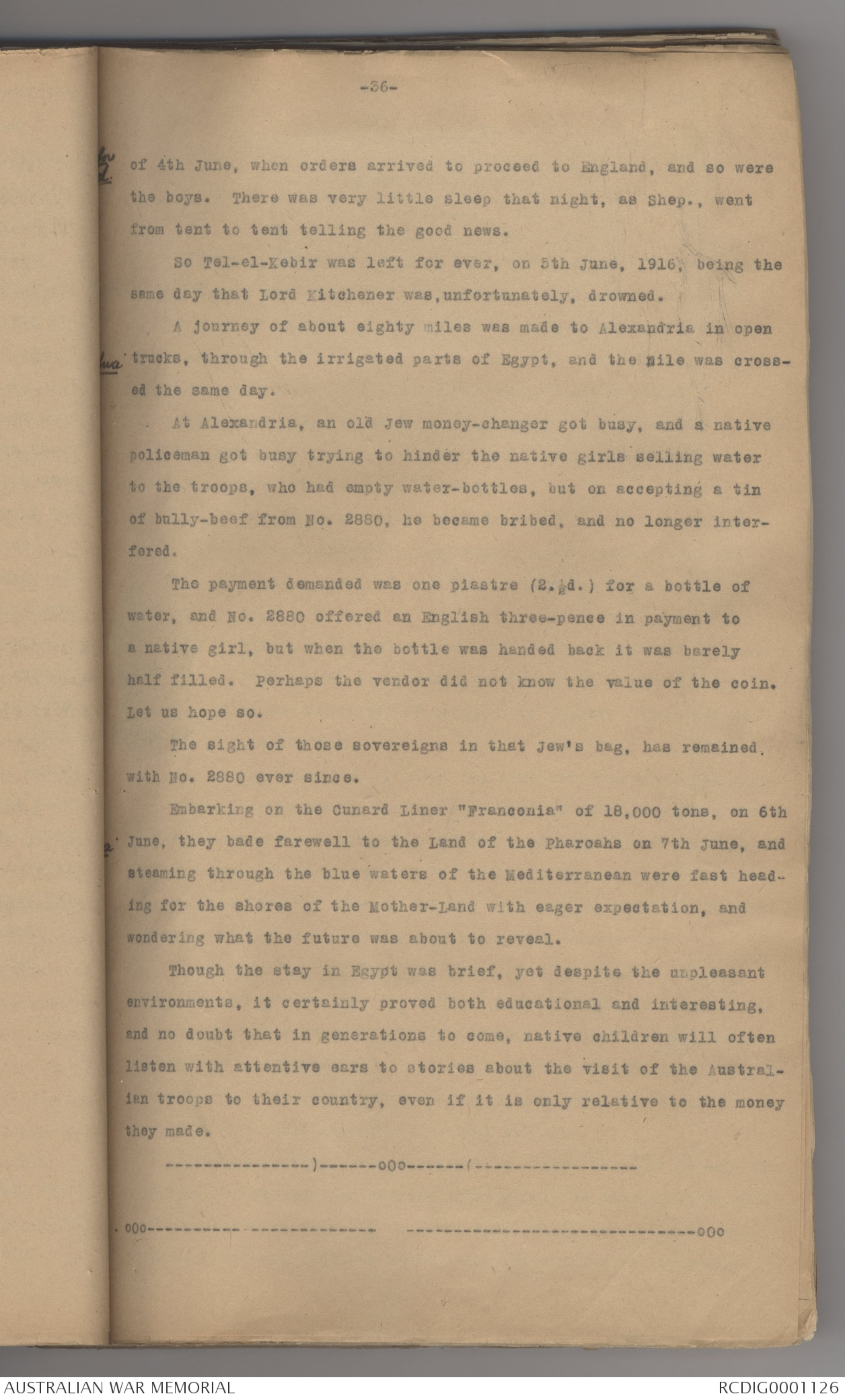
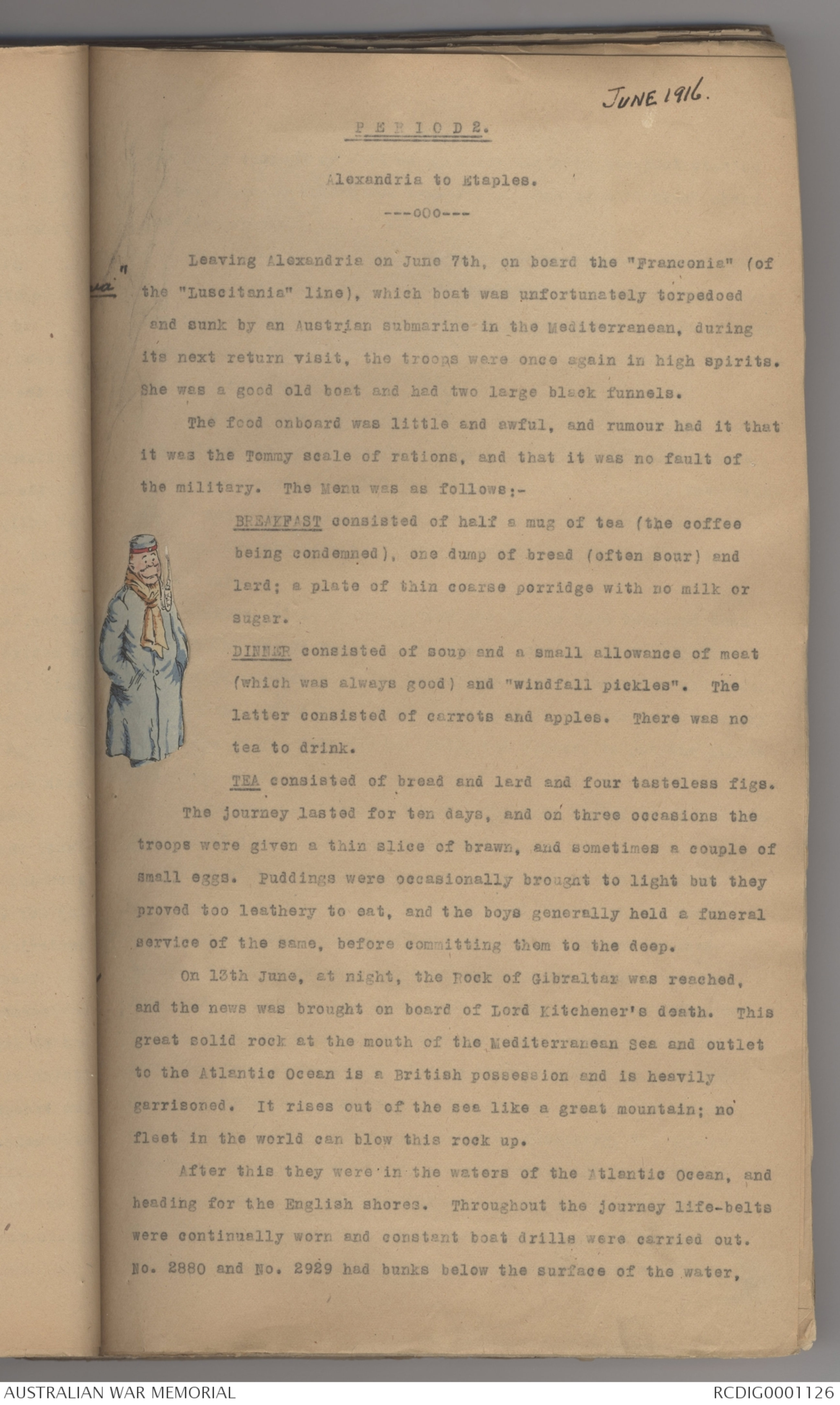
-29-
come, the Long Thinkers?"
Across the canal was a Circus. This was a rough affair, being
French also.
Birdwood House lay at one end of the camp, and it was there
that the joke originated about the drill. It was said that Mrs.
Birdwood saw the boys doubling on the sand in the hot sun. She
asked the General to bring the boys out again, to do it over, as
she did enjoy it so much.
The Cemetery lay closer towards the station. In that place
lie many British soldiers of famous regiments, and to-day some of
the Aussies lay side by side with them.
The Gippo did not like to be called names. Call him anything
out of the ordinary and he would invariably remark,"Never before
in my country, was I called one big black nigger till Australia
come."
The natives had queer boats on the canal. The method employed
to navigate the craft, was to haul it along by means of men
attached to ropes on the bank, and who walked along.
A spy was caught in the camp one day. A Sergeant-Major from
Cairo happened to recognise a "Gippo" behind a soft-drink counter,
as an escaped Turkish prisoner. The Turk ran across to the Circus
and entered the tent, but very soon came out after a couple
of shots were fired over the top. Next morning he departed, under
escort, to Cairo.
A fatal accident happened at drill one morning. A sergeant
was lying out in front of his musketry squad directing a man to
take aim at his eye. Unfortunately there was, by some chance,
a live round in the breach, and the sergeant was shot dead, the
bullet penetrating his eye.
Extract from a letter sent home by No. 2880 and written on
29th May, 1916, from Tel-el Kebir.
"Yesterday I slung my water-bottle, and carrying an entrenching
[*Field*] tool, tramped out into the desert. The day was hot. The
glare was awful. Thank Goodness, we have helmets (and in some
cases, smoked glasses and fly-nets) to avoid the unpleasant effects
of the sun. I was making for the old battle ground of Tel-el-Kebir
CAIRO. - En route for the fields.
CAIRO - The Pyramids.
CAIRO. - At the environs of the modern necropolis.
Photographs - see original
-30-
where General Wolsey fought a great battle, thirty four years ago.
I found the historic ground, and gazed around in wonder. Those
old breastworks and trenches extend for many miles in general
directions. They consist of huge mounds of thrown up earth and
stones. Lying on the desert are many pretty pebbles and stones.
I took a collection of them from the trenches, which I still have.
Eager to get souveniers, we dug out some old Martini-Henri cartridge
cases, and I happened to unearth one live round. Upon extracting
the powder it burnt feebly, in spite of its lying buried
in the sand for thirty-four years.
My curiosity led me a couple of miles ^ahead of my mates, and I soon
woke up to the fact that I was not alone in the burning desert,
which lay all around like a great sea of sand, and all sense of
direction would have been lost, but for the old breastworks which
acted as a guide back. I took a drink of water and gazed around
at the heat rising in black clouds from off the desert. Upon
looking up I spied some camels coming towards me. Not caring to
be alone with the Arabs (probably Bedouins) I decided as the Tommies
say "to beat it" (or to "hop it") for these nomads were not
to be trusted. While following the breastwork, a native, accompanied
by a donkey, came round a bend and gave me a small fright, and
after muttering what was unintelligible to me, passed on.
In places the battle-field is strewn with skeletons, both
animal and human. (I think this is caused by the constant drifting
of the sand, which both covers and uncovers.)
I visited the Cemetery and saw graves of the British soldiers
who were killed in action on 13th September, 1882. Some of our
own lads lie there now.
The heat is awful. I don't like the Egyptians at all. I prefer
the Cingalese. As it was in the Bible days, so it is now; one
sees things exactly to-day as then. Camels, goats, donkeys, mules
and oxen. Most of the donkeys are very pretty and docile creatures,
and it was both a common sight and a laughable one to see
a big, hulking Gippo with his long legs dangling down (and often
his wife with him, with generally an umbrella held over the pair)
riding along on a little donkey.
-31-
In the camp lines the Gippo boys used to let us have a donkey
ride for half-a-piastre, and it was great fun to see those donkey-
races.
Old styles of irrigation, the water-wheel-, and women carrying
pitchers of water on their heads, the palm trees, native dress.
the boats and the method of pulling them along, the old farm methods,
and the oxen thrashing wheat, the cultivation, all tend to remind
one of his Sunday School days."
During the days at Tel-el-Kebir the training and discipline
was hard. Captain Crompton told the boys that they were going to
be "tamed" in Egypt. (And this expression brings to mind a remark
of a certain Tommy-Serg.- Major, later on at the Bull Ring, Etaples,
France, who on running his eye along a new batch of Aussies, said
"We tame lions here". But I rather fancy he had the wrong breed of
lions to tame.)
"You are not going to run the show as you did in Australia",
said the Captain Crompton. "You are not yet fit to enter a European
city, but you will soon be", he said. And alas his prophesy came
too true.
The training course was thorough while it lasted. They were
told that they must forget all that they had learnt in Australia,
and were split up into small squads, and for a couple of weeks were
kept at learning saluting and squad-drill.
Now No. 2929 will smile when his mind wanders back to the morning
when his "pal in affliction", No. 2880, was introduced to the
"clink", by Lieutenant ----- (who unfortunately paid the supreme
sacrifice at Flers, in France, about November, 1916), for failing
to do a correct left turn.
A quaint old character was Captain Crompton. They all thought
him a nice old man, the first day they met him. They thought very
different afterwards though. The first lecture they got from old
Freddy was concerning the evils of Egypt. A few impressions of
Captain Crompton, (afterwards referred to, in all due respect as
"Freddy", in this sketch) which will never be forgotten by those
who knew him, must be related. Who in the eighth Brigade, has not
heard of him? Who has not heard of that old military maniac of
-32-
of Tel-el-Kebir and Lark Hill, England?
He was a remarkable old man, and had his good points, and in
the eyes of the troops under him, many bad ones.
He fell into disfavour over the Cairo picket affair. He
[*Picket*]
called for volunteers one day, to proceed to Cairo on picquet duty.
Here was a golden opportunity to have a glimpse of Cairo. At that
time that interesting City was declared "out of bounds" for six
weeks, as a round-up was in progress.
No. 2880 was assisting to put up tents at the time, but "Freddy"
wouldn't take him as a volunteer, because he had a button undone
on his tunic. No. 2929 was in luck's way and was accepted. The
picquet marched off to Cairo, but they never got there. Upon
arrival at the Tel-el-Kebir station, Freddy put them to work unloading
hay, full of prickles, from the trucks, till about midnight,
and then marched them back to camp, where as a kind of reward,
a dixie of cold soup was handed out. That's how he took the
boys to Cairo.
"A good soldier never drinks, he only wets his lips," was one
one of Freddy's mottos, and woe betide any soldier that he caught
"snatching" a drink on parade. "I can see you, if you attempt to
drink", he would tell them, but many a time he did not see a man
kneeling down and taking a drink, with a couple of his mates in
front of him as a screen, and many a time he did.
Sometimes he would allow the men to sit down, while he gave
a lecture, but no smoking was allowed (except at regular smoke-ohs)
At the same time, however, he always smoked himself, and very often
used to borrow a match off a man to light his pipe.
One day he tested the water-bottles and found them full, just
after the issue. Thereupon he laid down an order that no man was
to carry water on parade. His inconsistency was proved, when
about a week later the same man "raised Cain" because he found the
bottles empty. "How do you know that you might not get sudden
orders for a long march into the desert"?He said. Thus no one
knew how to take him.
Freddy had a horror of whiskers. On the nine o'clock parade
a man who had not shaved that morning "went up". Shaving overnight
-33-
was a crime. Freddy if he had any doubt, would actually feel
the chin. Moving up to a suspected case, he would say, "Did you
shave this morning?" "No, Sir, last night. Freddy would glare
at him and repeat the old parrot-cry, "Did you shave this morning?
One pace to the front--Quick march! Take his name Sergeant!"
Wherever he went he always had a Sergeant with him to enter
up the names for the Orderly Room, and amongst those interesting
personages, our old friend Shep., was daily found and there is no
doubt that he was one of the most conscientious and trusted Sergeants
in the whole of the A.I.F.
Freddy had a rather novel manner of selecting a fatigue party.
Upon inspection parade of a morning he would pick out all the men
who had not shaved, suspected of not having shaved, had a button
missing, had no pugaree on the helmet, had a dirty rifle, had the
puttees wound wrongly, had bootlaces crossed, had no field dressing
or identification disc ("dead meat ticket") had equipment wrong, etc.
etc., etc., and all these defaulters were "stone Jackas" for fatigue,
or his favourite punishment of "chasing the bugle."
He got forty names in this manner one day and No. 2880 and Billy
Watt happened to be two of the victims. The two latter were charged
with shaving overnight, and pleaded guilty. The humor of it all
was that nearly half an hour had been spent the night before in trying
to shave with blunt army razors in a tent, while the drifting
sand was filling the floor of the tent, and trying to cover the
blankets and equipment, not to mention getting mixed up with the
shaving gear. Freddy informed these men that he had a very dirty
job on hand for them to do. Later on, they got it.
About the only good this officer did was to aggravate the men,
but as he was a fairly old man it was overlooked for a long time.
But he could march, and it was a noticeable fact that in those
long marches over the sand, he always carried his full pack (not so,
generally with the other officers) and he was certainly in good condition.
He was always laying down the law about the winding of puttees.
Anyone who knew him in his old shabby uniform could maintain the
fact that one could almost crawl under his puttees, so loosely did
-34-
did he wind them.
Anyway he caused a great deal of humour for the troops.
During one march he halted for the usual ten minutes spell, at
the old breast-works, and his method of attracting attention of
men who wandered a little away, was to throw stones at them, and
when he gave the order to sit down, he insisted on the men doing
it in drill fashion, after the manner a tailor sits down to sew.
When he gave an order to sling arms across the back, he
would only allow one arm to be used. He positively delighted in
departing from the drill book.
On the first Sunday in Tel-el-Kebir, the usual church parade
was held. Freddy was O. C. of the C. of E. crowd, and to this day
the writer has a sound mental picture of the O.C. as he appeared
that day, dressed in slacks and carrying gloves. The place of
worship was quite handy, but Freddy must have his little joke,
and instead of the usual procedure of marching direct, he took the
lads for a long "joy-route-march" and finally reached the "church'
which was a bark-humpy. Somehow, the desert held charms for him.
The result was that the following Sabbath most of the men went to
another denomination.
He was a mean "old cuss", for he told the boys not to write as
many letters, as they were ^doing to Australia". I write but one letter
and that goes all around to my relations" he told them.
Naturally there was a lot of conjecture as to what he was in
civilian life. No one appeared to know, but the general opinion
was the he must have been a warder in a gaol.
He was very sarcastic, and was always "rubbing it in". When
marching along he would call out the step by saying "Left, right,
left, I had a good home and I left, right, left." And then he wondered
why there was murmuring in the ranks. If he failed to hear
the remark that some more daring fellow would call out, he would
say, "And so are you".
Leaving Freddie for the present, the sketch now runs on. The
writer, however is fully convinced that had Charles Dickens ever
met Freddy, he certainly would have had an entirely new character
to deal with, for it is doubtful whether London with its teeming
-35-
millions can produce such a personage.
Donniger (the Hoop-La King) took the boys' photos, standing
outside the tent, one day, but unfortunately no one ever saw any
of the copies. This was a pity as they would have become an interesting
souvenier.
A few days later a sandstorm took place, which blew sand into
the tents and buried all gear. This experience is very unpleasant
and the scorching winds from the desert are not enjoyable either
to man or beast.
It was amusing, to watch the Gippos working in large parties.
They usually sang a song which sounded like "Talahena" (a native
word) repeated over and over again. Train loads of them would
pass the camp daily, and on passing they would make queer noises
and throw their hands about just like a lot of monkeys.
The Gippo barbers in the camp lines were awful. It was agony.
and perhaps risky to trade with them. But it was funny to hear the
boys abusing those barbers. No. 2880 had a couple of shaves, but
no more. Once the Gippo got his "victim" on the chair, he gave him
an awful rough passage, and upon departure he would discover that
about half his beard would still be where it originally was.
No. 2880 gave his razor to a Gippo to be done up. Upon receipt,
it was worse than it formerly was, and his faith in Gippo tradesmen
began to get very small indeed. Those soft-drink vendors had to be
roared up too, as they, if ignored, would dilute with about ninety
per cent. water. They were all robbers, or as one would say to-day
profiteers.
Some of the Gippos actually wore bangles on their knees.
The language was Arabic. Some of the most common words were:)(-
1. Talahena.
2. Hickory.
3. Sieda.
4. Roo Minhina.
5. Imshi Yalla.
An Egyptian usually lived in a kind of mud house, and with him
lived his family consisting, apart from human beings, his donkey,
fowls, etc., for all lived together.
"Old Shep.," the worthy sergeant, was quite excited on the night
-36-
of 4th June, when orders arrived to proceed to England, and so were
the boys. There was very little sleep that night, as Shep., went
from tent to tent telling the good news.
So Tel-el-Kebir was left for ever, on 5th June, 1916, being the
same day that Lord Kitchener was, unfortunately, drowned.
A journey of about eighty miles was made to Alexandria in open
trucks, through the irrigated parts of Egypt, and the Nile was crossed
the same day.
At Alexandria, an old Jew money-changer got busy, and a native
policeman got busy trying to hinder the native girls selling water
to the troops, who had empty water-bottles, but on accepting a tin
of bully-beef from No. 2880, he became bribed, and no longer interfered.
Tho payment demanded was one piastre (2.½d.) for a bottle of
water, and No. 2880 offered an English three-pence in payment to
a native girl, but when the bottle was handed back it was barely
half filled. Perhaps the vendor did not know the value of the coin.
Let us hope so.
The sight of those sovereigns in that Jew's bag, has remained,
with No. 2880 ever since.
Embarking on the Cunard Liner "Franconia" of 18,000 tons, on 6th
June, they bade farewell to the Land of the Pharoahs on 7th June, and
steaming through the blue waters of the Mediterranean were fast heading
for the shores of the Mother-Land with eager expectation, and
wondering what the future was about to reveal.
Though the stay in Egypt was brief, yet despite the unpleasant
environments, it certainly proved both educational and interesting,
and no doubt that in generations to come, native children will often
listen with attentive ears to stories about the visit of the Australian
troops to their country, even if it is only relative to the money
they made.
JUNE 1916.
PERIOD 2.
Alexandria to Etaples.
Leaving Alexandria on June 7th, on board the "Franconia" (of
the "Luscitania" line), which boat was unfortunately torpedoed
and sunk by an Austrian submarine in the Mediterranean, during
its next return visit, the troops were once again in high spirits.
She was a good old boat and had two large black funnels.
The food onboard was little and awful, and rumour had it that
it was the Tommy scale of rations, and that it was no fault of
the military. The Menu was as follows;-
Hand drawn diagram - see original
BREAKFAST consisted of half a mug of tea (the coffee
being condemned), one dump of bread (often sour) and
lard; a plate of thin coarse porridge with no milk or
sugar.
DINNER consisted of soup and a small allowance of meat
(which was always good) and "windfall pickles". The
latter consisted of carrots and apples. There was no
tea to drink.
TEA consisted of bread and lard and four tasteless figs.
The journey lasted for ten days, and on three occasions the
troops were given a thin slice of brawn, and sometimes a couple of
small eggs. Puddings were occasionally brought to light but they
proved too leathery to eat, and the boys generally held a funeral
service of the same, before committing them to the deep.
On 13th June, at night, the Rock of Gibraltar was reached,
and the news was brought on board of Lord Kitchener's death. This
great solid rock at the mouth of the Mediterranean sea and outlet
to the Atlantic Ocean is a British possession and is heavily
garrisoned. It rises out of the sea like a great mountain; no
fleet in the world can blow this rock up.
After this they were in the waters of the Atlantic Ocean, and
heading for the English shores. Throughout the journey life-belts
were continually worn and constant boat drills were carried out.
No. 2880 and No. 2929 had bunks below the surface of the water,
 Transcriber 206
Transcriber 206This transcription item is now locked to you for editing. To release the lock either Save your changes or Cancel.
This lock will be automatically released after 60 minutes of inactivity.